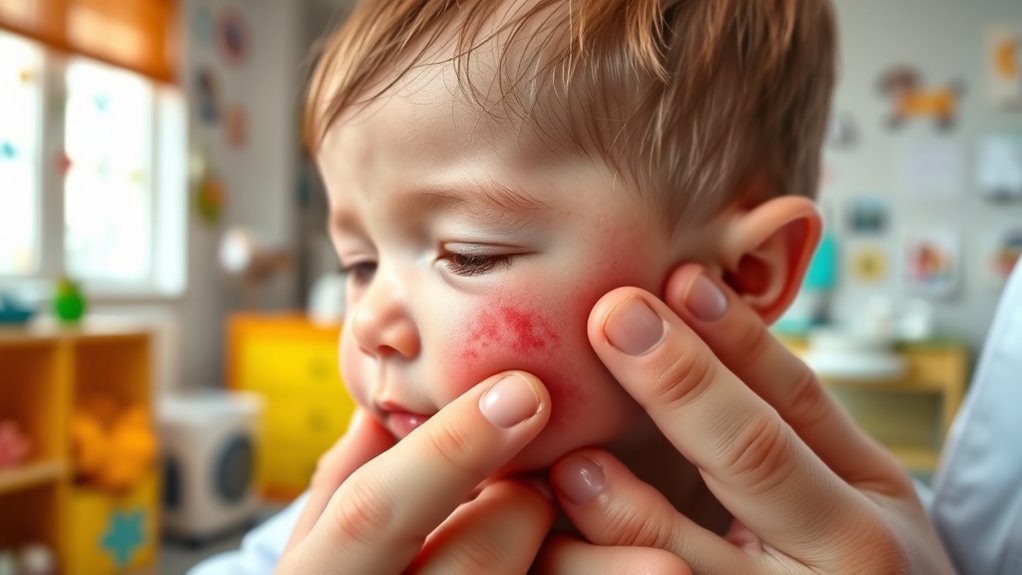To care for your infant’s eczema, focus on keeping their skin well-hydrated with gentle, fragrance-free moisturizers twice daily, especially after baths. Use lukewarm water and pat the skin dry to prevent irritation. Avoid potential triggers like certain fabrics, environmental allergens, and foods that worsen flare-ups. Follow your dermatologist’s instructions for medications and maintain a calm, consistent routine. If you want practical tips on reducing discomfort and protecting your baby’s skin, there’s plenty more to discover.
Key Takeaways
- Regularly moisturize with gentle, fragrance-free products, especially after baths, to maintain skin hydration and barrier function.
- Identify and avoid common triggers like certain foods, fabrics, and environmental allergens to prevent flare-ups.
- Follow prescribed topical treatments precisely and seek prompt medical advice for signs of infection or worsening symptoms.
- Keep nails trimmed and use soft clothing to minimize skin damage from scratching and irritation.
- Educate caregivers on consistent skincare routines and trigger management for effective long-term eczema control.

Pediatric eczema can be challenging for both parents and children, but with proper care, you can effectively manage the condition. One of the most important aspects of eczema management is maintaining skin hydration. When your child’s skin stays moisturized, it forms a protective barrier that reduces irritation and prevents flare-ups. Use gentle, fragrance-free moisturizers regularly, especially after baths, to lock in moisture. Avoid hot water during baths, as it can strip away natural oils and worsen dryness. Instead, opt for lukewarm water and keep baths brief. Pat your child’s skin dry gently with a soft towel, then immediately apply moisturizer to seal in hydration. Consistent skin hydration helps soothe itching and reduces the risk of the skin becoming cracked or infected.
Consistently moisturizing your child’s skin prevents flare-ups and keeps it healthy and protected.
Another key factor in managing pediatric eczema is identifying and avoiding allergy triggers. Many children have sensitivities that can worsen their eczema symptoms, such as certain foods, fabrics, or environmental factors. Keep a detailed record of your child’s activities, diet, and environment to help pinpoint potential triggers. For example, if you notice flare-ups after eating certain foods, consult with your healthcare provider about possible food allergies. Similarly, some fabrics like wool or synthetic materials can irritate sensitive skin, so opt for soft, breathable cotton clothes instead. Environmental triggers such as pollen, pet dander, or dust mites can also contribute. Use allergen-proof covers on pillows and mattresses, and keep your home clean to minimize exposure. Understanding and avoiding these triggers can markedly reduce the frequency and severity of eczema flare-ups.
Additionally, staying informed about the latest research on skin health can help you make better decisions regarding your child’s skincare routine and allergy management. It’s also essential to establish a consistent skincare routine. Applying moisturizer at least twice daily, especially after baths, keeps skin hydrated and less prone to irritation. Use prescribed topical medications exactly as directed by your child’s dermatologist to control inflammation during flare-ups. Be cautious with soaps and cleansers—choose mild, fragrance-free options to prevent further irritation. If your child shows signs of infection, such as increased redness, oozing, or crusting, seek prompt medical advice. Early intervention can prevent worsening symptoms and complications.
In addition to physical care, creating a soothing environment helps manage itching and discomfort. Keep your child’s nails trimmed to prevent skin damage from scratching, and consider using soft, breathable clothing that doesn’t irritate sensitive skin. Remember, managing pediatric eczema is a continuous process that involves attention to hydration, triggers, and overall skin health. With patience and consistent care, you can help your child live more comfortably and reduce the impact of eczema on their daily life.
Frequently Asked Questions
Can Diet Influence My Infant’s Eczema Severity?
Yes, your diet can influence your infant’s eczema severity. Diet modification may help if certain foods trigger allergic reactions or worsen symptoms. Pay attention to your baby’s responses after eating new foods, and consult a pediatric dermatologist for personalized advice. Nutritional impact is important, so make certain your infant gets a balanced diet while avoiding known allergens. This proactive approach can help reduce eczema flare-ups and improve overall skin health.
Are There Natural Remedies for Infant Eczema?
You can try natural remedies like herbal remedies and oil treatments to soothe your infant’s eczema. Coconut oil, for example, has moisturizing properties and can reduce inflammation, while herbal remedies like chamomile or calendula may calm irritated skin. Always patch-test first and consult your pediatrician before starting any new treatment. These natural options can complement medical care and help keep your baby comfortable and skin healthy.
How to Distinguish Eczema From Other Skin Conditions?
To tell eczema apart from other skin conditions, look for signs like persistent skin irritation, dryness, and redness that often appear on specific areas such as cheeks or behind the knees. Rashes caused by eczema tend to be itchy and may blister or ooze. Pay attention to rash differentiation; if the rash is widespread, different in appearance, or doesn’t improve with basic care, consult a pediatric dermatologist for an accurate diagnosis.
When Should I Consider Allergy Testing for My Baby?
Imagine your baby’s skin as a garden overrun by weeds; if you notice persistent rashes or flare-ups despite avoiding common eczema triggers, it’s time to think about allergy testing. If your infant shows signs of allergy, like swelling or difficulty breathing, seek immediate help. Allergy testing helps identify specific allergens causing eczema triggers, guiding you to better manage your baby’s skin and reduce discomfort. Trust your instincts and consult your pediatrician when in doubt.
Is It Safe to Use Over-The-Counter Creams Regularly?
Using over-the-counter creams regularly can be safe if you follow label instructions and consult your pediatrician. However, consider over-the-counter safety concerns and the potential long-term effects of frequent use. Some creams may contain ingredients that could cause skin thinning or irritation over time. Always check with your child’s doctor before continuous use, especially for infants, to make certain you’re protecting their delicate skin and minimizing any risks.
Conclusion
Think of caring for your baby’s eczema like tending a delicate garden. With gentle, consistent care and the right tools, you help your little one’s skin bloom and thrive. Remember, patience is your sunlight, and gentle routines are your water. Soon, you’ll see your baby’s skin start to flourish, free from irritation. Keep nurturing with love and care, and watch this tiny garden grow stronger each day. Your attentive hands make all the difference.









